 When man was created, he was placed in a garden. That garden was perfect in every way, and only one tree was off-limits. Adam and Eve were asked to submit their wills to their Creator by not eating from the tree of the knowledge of good and evil. All was well until their desires were awakened. Then, for the first time, they felt the tension between their will and God’s will. Maybe they’d never considered their choices before. Maybe, just for a moment, they felt pity for themselves because God had denied them the fruit from the one tree. We may never know, but what we do know is this: God wanted something for them, but they wanted something else for themselves. They chose what they wanted and stepped outside of God’s will for the first time. The consequences for their choice were disastrous.
When man was created, he was placed in a garden. That garden was perfect in every way, and only one tree was off-limits. Adam and Eve were asked to submit their wills to their Creator by not eating from the tree of the knowledge of good and evil. All was well until their desires were awakened. Then, for the first time, they felt the tension between their will and God’s will. Maybe they’d never considered their choices before. Maybe, just for a moment, they felt pity for themselves because God had denied them the fruit from the one tree. We may never know, but what we do know is this: God wanted something for them, but they wanted something else for themselves. They chose what they wanted and stepped outside of God’s will for the first time. The consequences for their choice were disastrous.
On the night before his crucifixion, Jesus returned to a garden. He was no stranger to the garden of Gethsemane, having frequented it with his disciples. But this time was different. In the Garden of Eden, the will of man had been tempted, and man had chosen independence over surrender. In the Garden of Gethsemane, the will of man would be tempted again, but this time the desire for God’s will would overpower personal desires. Jesus expressed this in prayer with the words:
Nevertheless, not my will, but yours be done.
He had progressed in his understanding of, and obedience to, his Father’s will. In the midst of intensely difficult circumstances that would cause even the strongest of men or women to pity themselves, Jesus held such feelings at bay by focusing on the will of God and pursuing it with abandon. Jesus submitted to the will of God because he trusted the character of God. Three aspects of God’s character will increase our confidence to seek his will over our own: his wisdom, his love, and his power.
God’s Wisdom
Living with suffering is hard work. It’s easy to lose your focus. Once your focus is disoriented, it becomes difficult to avoid self-pity. Suffering can come in many forms, not all of them physical. Our mind struggles with harsh and critical statements that seem unjustified. Our emotions vacillate between confusion, anger, and grief when circumstances in our life seem to contradict the hand of a loving God. When the apostle Peter heard of the suffering that Jesus would have to endure, he tried to protect Jesus. He said, “Far be it from you, Lord! This shall never happen to you.” Jesus’ answer was quick and to the point: “Get behind me, Satan! You are a hindrance to me. For you are not setting your mind on the things of God, but the things of man.”
Jesus focused on a specific aspect of the character of God—his wisdom. God thinks differently than man thinks. The wisdom of man is short-sighted and pragmatic, but God’s wisdom is eternal and directed purposefully. The ability to focus on the character of God—not the wisdom of man—is a quality that Jesus developed, and he exercised it most fully in the garden of Gethsemane.
God’s Love
As the suffering of the cross drew near, Jesus asked if there might be another way. Mark recounts it this way:
And he said, ‘Abba, Father, all things are possible for you. Remove this cup from me. Yet not what I will, but what you will.’
Abba is a family term. It might best be rendered in the language of our day as “Daddy.” When my kids want the quickest access to my heart, this is how they address me. It’s the term that every dad knows—like they’re saying, “Dad, I know you love me.” Jesus is clinging to the character of his Father’s love. He finds resolve for submitting to his Father’s will by reflecting upon his Father’s love. Believing that God is all-wise means that God knows what is best for us; believing that he is all-loving means that he wants what is best for us. With gut-wrenching suffering on the horizon, Jesus didn’t question his Father’s love.
God’s Power
Immediately following Jesus’ affirmation of his Father’s love, he affirms his Father’s power. He says, “all things are possible for you.” This is not the first time Jesus has used those words. He had acknowledged God’s power on other occasions with the very same phrase. But in the Garden of Gethsemane, his belief is tested at the highest level. Does he really believe that the Father has the power to act if he should choose? Yes, he does. This is expressed in his final words from the cross, “Father, into your hands I commit my Spirit.” Having breathed his last, he reveals a complete dependence. Jesus believes his all-powerful Father will bring about his resurrection. Jesus embraces the will of God by focusing on the character of God. He does not question his Father’s wisdom, love, or power. This enables him to surrender his will to his Father’s.
One of my seminary professors who made a profound impact on my life was Dr. Fred Barshaw. Prior to becoming a pastor, Fred served as a public school teacher. Gifted in understanding the learning process, he received the esteemed “Teacher of the Year” award for the state of California. Fred’s strength was his application of the Word to real life situations, and I was drawn to the unique ways he found to communicate. During my final year, Fred began his battle with cancer. I graduated and headed into ministry on the other side of the continent. Several years later, I was developing material for a class I was teaching, when I realized my lay out and presentation looked strikingly familiar. I went to my filing cabinet, pulled out my notes from one of Fred’s classes, placed them next to my own, and immediately recognized the similarity. It almost looked like I had plagiarized. Having not intended to do so, I realized I was teaching just like my teacher. I picked up the phone and called Fred, wanting to communicate my deep sense of gratitude for his investment in my life. Cancer had taken its toll. He was short of breath and spoke with a hoarse whisper. Because he was so weak I expressed my appreciation quickly, then asked how I could pray for him. There was a long pause and then the words: “pray that I would be faithful to the end.” A remarkable request considering the amount of pain and suffering he was enduring. I prayed that way. Within a month Fred Barshaw died, faithful to the end.
Our response to suffering can take one of two roads. Either we can seek to do God’s will by dwelling upon his character, or we can focus on the difficulty of our circumstances. If we choose the latter, self-pity won’t be far behind. Fred Barshaw did what Jesus did. To the very end he sought the will of God, and that’s what we should do too.
Taken from Dead-End Desire: biblical strategies for overcoming self-pity
 Sometimes the most profound statements come from the most ordinary circumstances. Years ago, I was helping my daughter, who was in 5th grade at the time, with her Math homework. The assignment was introducing her to the metric system. Suddenly, I had a flash-back. There I was, sitting in my 5th grade classroom, and my Math teacher was telling us that we needed to learn the metric system because within a few years everyone in America would be using it. I shared the thought with my daughter, and added this comment: “Here we are 35 years later, and Americans are still stubbornly refusing to switch to the system that everyone else uses. I wonder why that is?” My eleven-year old looked up from her homework as if the answer was obvious. She distilled 35 years of history into less than 20 words when she said, “People don’t like change, Dad. Well, unless of course they get something out of it for themselves.”
Sometimes the most profound statements come from the most ordinary circumstances. Years ago, I was helping my daughter, who was in 5th grade at the time, with her Math homework. The assignment was introducing her to the metric system. Suddenly, I had a flash-back. There I was, sitting in my 5th grade classroom, and my Math teacher was telling us that we needed to learn the metric system because within a few years everyone in America would be using it. I shared the thought with my daughter, and added this comment: “Here we are 35 years later, and Americans are still stubbornly refusing to switch to the system that everyone else uses. I wonder why that is?” My eleven-year old looked up from her homework as if the answer was obvious. She distilled 35 years of history into less than 20 words when she said, “People don’t like change, Dad. Well, unless of course they get something out of it for themselves.”


 First Peter 5:7 is one of the sweetest verses in the Bible. Peter recorded this truth for people who were under severe persecution. He writes, “Casting all you anxieties on him, because he cares for you.” We all have the desire to control things that we cannot, and we often forget how deeply God cares for us. If I had authored the verse, I might have chosen a different quality of God to emphasize. Something like his perfect wisdom or his unlimited power. Logically, it would make more sense to think that even though I am not in control, an all-wise, all-powerful God is. But the Holy Spirit saw fit to inspire Peter otherwise, and I’m glad he did. When it comes to anxiety, he chose to emphasize the compassionate, softer side of God. When I am fearful, I find comfort in this truth: I’m not alone in my struggle, and God cares.
First Peter 5:7 is one of the sweetest verses in the Bible. Peter recorded this truth for people who were under severe persecution. He writes, “Casting all you anxieties on him, because he cares for you.” We all have the desire to control things that we cannot, and we often forget how deeply God cares for us. If I had authored the verse, I might have chosen a different quality of God to emphasize. Something like his perfect wisdom or his unlimited power. Logically, it would make more sense to think that even though I am not in control, an all-wise, all-powerful God is. But the Holy Spirit saw fit to inspire Peter otherwise, and I’m glad he did. When it comes to anxiety, he chose to emphasize the compassionate, softer side of God. When I am fearful, I find comfort in this truth: I’m not alone in my struggle, and God cares.
 King David was a man after God’s own heart, yet his temptation with Bathsheba revealed a lack of the kind of character he exhibited when he was younger. God had chosen him as king (instead of one of his older brothers) for his purity of heart. However, as his story unfolded, those key inner qualities that he once possessed began to fade. While the compromises may have seemed small at first, they left him vulnerable in his battle with sexual temptation.
King David was a man after God’s own heart, yet his temptation with Bathsheba revealed a lack of the kind of character he exhibited when he was younger. God had chosen him as king (instead of one of his older brothers) for his purity of heart. However, as his story unfolded, those key inner qualities that he once possessed began to fade. While the compromises may have seemed small at first, they left him vulnerable in his battle with sexual temptation.
 The bellowing of the giant echoed across the valley floor. The boy-king looked down into the Brook of Elah. Shimmering waters rolled over the small stones at the waters’ edge. Undeterred by the giant’s size, strength, or reputation, the boy-king picked up five small stones and slipped them into his shepherd’s bag. These were not your typical rocks for child’s play. They were barium sulphate—twice the density of normal stones. When launched from his sling at 100 m.p.h. they would have the stopping power of a .45 caliber handgun. At nearly ten feet tall, the giant appeared invincible, but appearances can be deceiving. The boy-king had five stones and the skill of a sniper. He raised his voice in answer to the giant’s intimidation:
The bellowing of the giant echoed across the valley floor. The boy-king looked down into the Brook of Elah. Shimmering waters rolled over the small stones at the waters’ edge. Undeterred by the giant’s size, strength, or reputation, the boy-king picked up five small stones and slipped them into his shepherd’s bag. These were not your typical rocks for child’s play. They were barium sulphate—twice the density of normal stones. When launched from his sling at 100 m.p.h. they would have the stopping power of a .45 caliber handgun. At nearly ten feet tall, the giant appeared invincible, but appearances can be deceiving. The boy-king had five stones and the skill of a sniper. He raised his voice in answer to the giant’s intimidation:
 Jesus saw people differently than we do. When the disciples saw children as a nuisance; Jesus saw them as citizens of heaven. When the religious leaders saw the tax-collectors as despicable; Jesus saw them as reachable. And when men saw prostitutes as disposable; Jesus saw them as redeemable—women in need of healing and forgiveness.
Jesus saw people differently than we do. When the disciples saw children as a nuisance; Jesus saw them as citizens of heaven. When the religious leaders saw the tax-collectors as despicable; Jesus saw them as reachable. And when men saw prostitutes as disposable; Jesus saw them as redeemable—women in need of healing and forgiveness.
 Let me illustrate with an imaginary character by the name of Jack. Jack has anger problems. He knows it. His boss knows it, and most significantly, his family knows it. Like all of us, Jack’s inner life is comprised of his thoughts, emotions, and choices. But because of the deceptive nature of emotion, it always feels like circumstances are conspiring against him. And because he determines truth largely by how he feels, he believes other people are causing his anger. It’s almost as if he’s not an active participant. The reason Jack feels this way is that when he’s angry, his thoughts seem to run on their own; he doesn’t feel in control of his emotions. The only thing left of Jack’s inner identity is his choices. Yet, with his thoughts and emotions fueled by his anger, it feels as if his choices have been taken away as well. He’s even expressed it this way: I don’t have a choice but to get angry. Jack feels like he’s boxed in. We might even think of him as “Jack-in-the-box.”
Let me illustrate with an imaginary character by the name of Jack. Jack has anger problems. He knows it. His boss knows it, and most significantly, his family knows it. Like all of us, Jack’s inner life is comprised of his thoughts, emotions, and choices. But because of the deceptive nature of emotion, it always feels like circumstances are conspiring against him. And because he determines truth largely by how he feels, he believes other people are causing his anger. It’s almost as if he’s not an active participant. The reason Jack feels this way is that when he’s angry, his thoughts seem to run on their own; he doesn’t feel in control of his emotions. The only thing left of Jack’s inner identity is his choices. Yet, with his thoughts and emotions fueled by his anger, it feels as if his choices have been taken away as well. He’s even expressed it this way: I don’t have a choice but to get angry. Jack feels like he’s boxed in. We might even think of him as “Jack-in-the-box.” But the Bible teaches that Jack isn’t trapped in a box where his emotions, thoughts, and choices are decided for him. Notice the propositional statements of Scripture: It is for freedom that Christ has set us free (Gal. 5:1). I can do all things through Christ who strengthens me (Phil. 4:13). Or do you not know that you are the slave of whatever you choose to obey (Rom. 6:16). For you were called to freedom, brothers…through love serve one another (Gal. 5:13). As a believer, a better presentation of Jack would look like this image. Jack is set free to engage his emotions, thoughts and choices as he will. He received a new heart at the point of salvation. That new heart, filled with the Spirit of God, enables him to set his thoughts upon Christ, engage his emotions around the things of God, and make choices in light of the will of God. Certainly this is a process, and I would not want to infer that an emotional change takes place overnight. Still, our emotions usually follow what we have chosen to think about. With his new heart, Jack can now make choices and think differently than he did before. This is a theological reality that is incredibly freeing.
But the Bible teaches that Jack isn’t trapped in a box where his emotions, thoughts, and choices are decided for him. Notice the propositional statements of Scripture: It is for freedom that Christ has set us free (Gal. 5:1). I can do all things through Christ who strengthens me (Phil. 4:13). Or do you not know that you are the slave of whatever you choose to obey (Rom. 6:16). For you were called to freedom, brothers…through love serve one another (Gal. 5:13). As a believer, a better presentation of Jack would look like this image. Jack is set free to engage his emotions, thoughts and choices as he will. He received a new heart at the point of salvation. That new heart, filled with the Spirit of God, enables him to set his thoughts upon Christ, engage his emotions around the things of God, and make choices in light of the will of God. Certainly this is a process, and I would not want to infer that an emotional change takes place overnight. Still, our emotions usually follow what we have chosen to think about. With his new heart, Jack can now make choices and think differently than he did before. This is a theological reality that is incredibly freeing. But, when Jack is angry, it doesn’t feel that way. From his perspective in the box, it feels like anger is happening to him—like others are causing his anger. His son’s refusal to do his homework consumes his thoughts, his daughter’s belligerence fuels his emotions; and when his wife greets him at the door with a honey-do list, Jack feels like his choices for the weekend have already been made for him. As shown below, from where Jack stands in the box, it feels like his thoughts, emotions, and choices are out of his control. When anger is at work, he doesn’t feel free in Christ. He believes he has no other choice but to get angry. Because of our tendency to shift the blame for our wrongdoing to others, we are prone to interpret our anger in the passive voice. We are quick to say, “You make me so angry when you do that.” This is the angry man’s belief system: he believes that others are causing his anger.
But, when Jack is angry, it doesn’t feel that way. From his perspective in the box, it feels like anger is happening to him—like others are causing his anger. His son’s refusal to do his homework consumes his thoughts, his daughter’s belligerence fuels his emotions; and when his wife greets him at the door with a honey-do list, Jack feels like his choices for the weekend have already been made for him. As shown below, from where Jack stands in the box, it feels like his thoughts, emotions, and choices are out of his control. When anger is at work, he doesn’t feel free in Christ. He believes he has no other choice but to get angry. Because of our tendency to shift the blame for our wrongdoing to others, we are prone to interpret our anger in the passive voice. We are quick to say, “You make me so angry when you do that.” This is the angry man’s belief system: he believes that others are causing his anger. But remember that the Bible speaks of anger occurring in the middle voice. So, to bring what you believe in line with what the Bible is teaching, you need to say, “I make myself so angry when you do that.” Jack believes he is in a box because of what others are doing, but the truth is that he is the one controlling his thoughts, emotions, and choices. Biblically speaking, Jack’s anger occurs in the middle voice—he is the one causing it. This is why you will never overcome anger without first correcting your belief system. While anger feels like something that’s happening to you, it is actually something that you are doing to yourself. Your belief system matters. When you think about how you were wronged, you feel more justified in your belief system, and anger naturally follows. If you meditate on anything long enough, you will begin to believe it. The order matters: thinking leads to belief, belief fuels your emotions, and the emotions erupt in angry speech, actions, and attitude.
But remember that the Bible speaks of anger occurring in the middle voice. So, to bring what you believe in line with what the Bible is teaching, you need to say, “I make myself so angry when you do that.” Jack believes he is in a box because of what others are doing, but the truth is that he is the one controlling his thoughts, emotions, and choices. Biblically speaking, Jack’s anger occurs in the middle voice—he is the one causing it. This is why you will never overcome anger without first correcting your belief system. While anger feels like something that’s happening to you, it is actually something that you are doing to yourself. Your belief system matters. When you think about how you were wronged, you feel more justified in your belief system, and anger naturally follows. If you meditate on anything long enough, you will begin to believe it. The order matters: thinking leads to belief, belief fuels your emotions, and the emotions erupt in angry speech, actions, and attitude. Biblical Strategies is excited to introduce 4M Training: a unique approach to spiritual growth for men. We encourage men to: Mature in their faith, Master key habits, Minister inside and out, and Mentor the next generation. This is done through a brief teaching video, guided small group discussion and accountability as the men develop the key habits of Bible reading, Scripture retrieval, prayer, and walking in the Spirit. Here’s a look at Unit 1: lesson 1 (both the video and the manual). Welcome to 4M Training: a unique approach to spiritual growth for men. Available November, 2017.
Biblical Strategies is excited to introduce 4M Training: a unique approach to spiritual growth for men. We encourage men to: Mature in their faith, Master key habits, Minister inside and out, and Mentor the next generation. This is done through a brief teaching video, guided small group discussion and accountability as the men develop the key habits of Bible reading, Scripture retrieval, prayer, and walking in the Spirit. Here’s a look at Unit 1: lesson 1 (both the video and the manual). Welcome to 4M Training: a unique approach to spiritual growth for men. Available November, 2017.
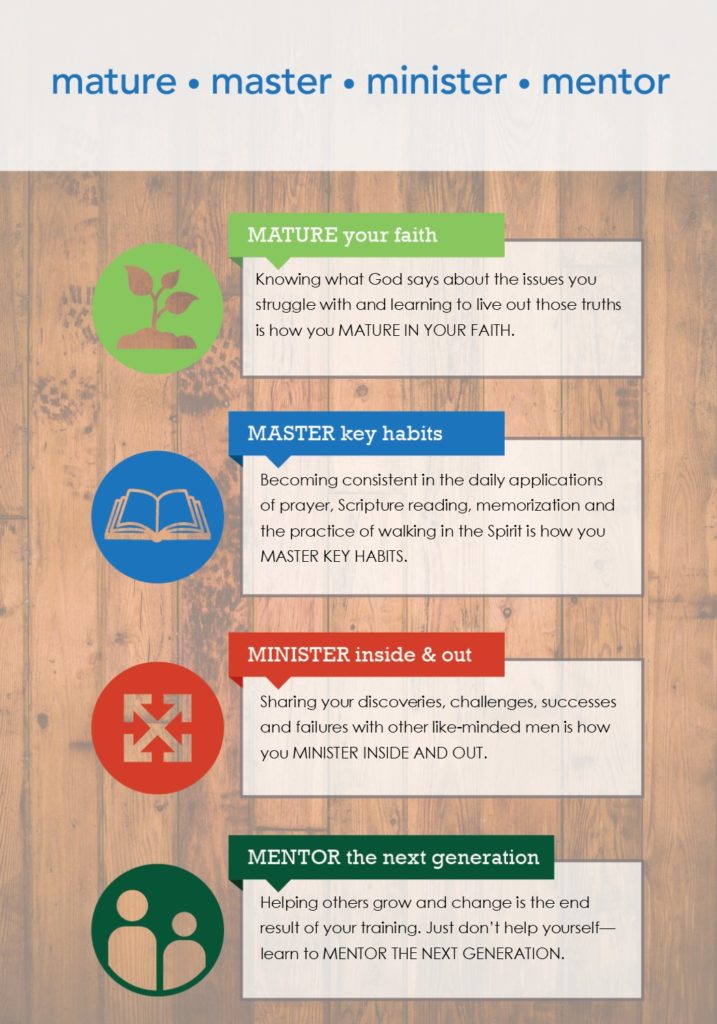
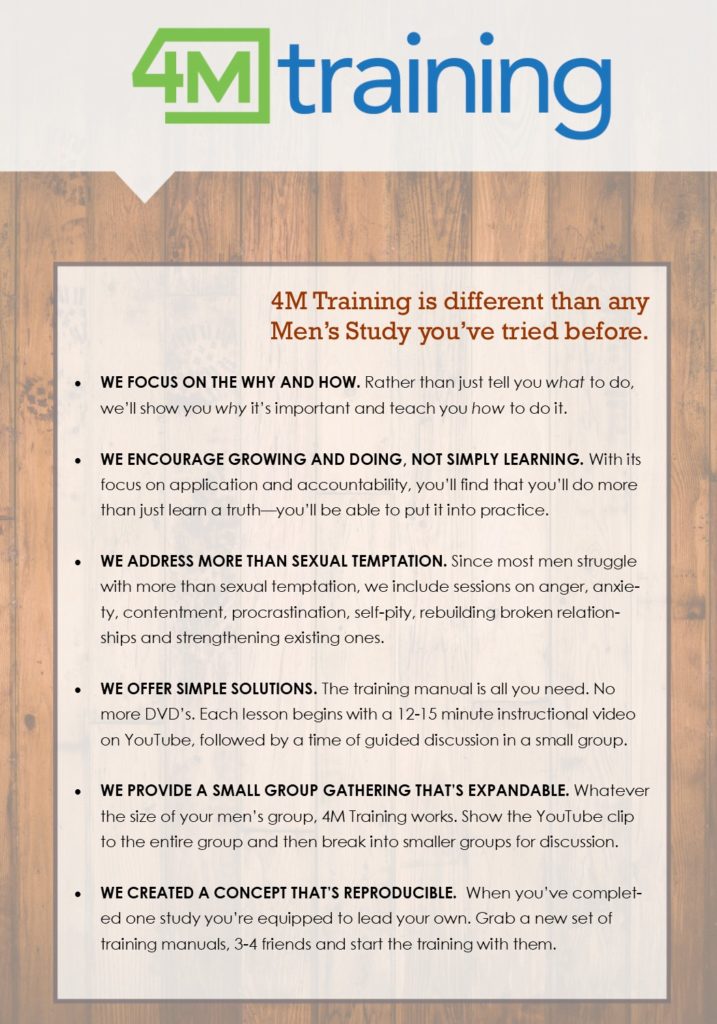
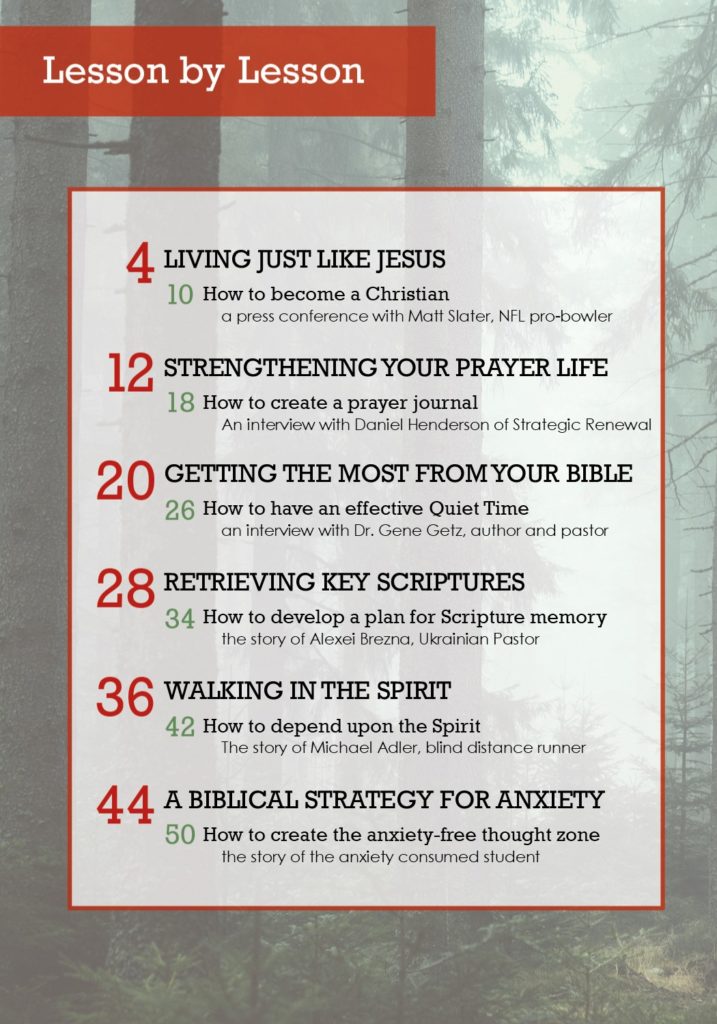
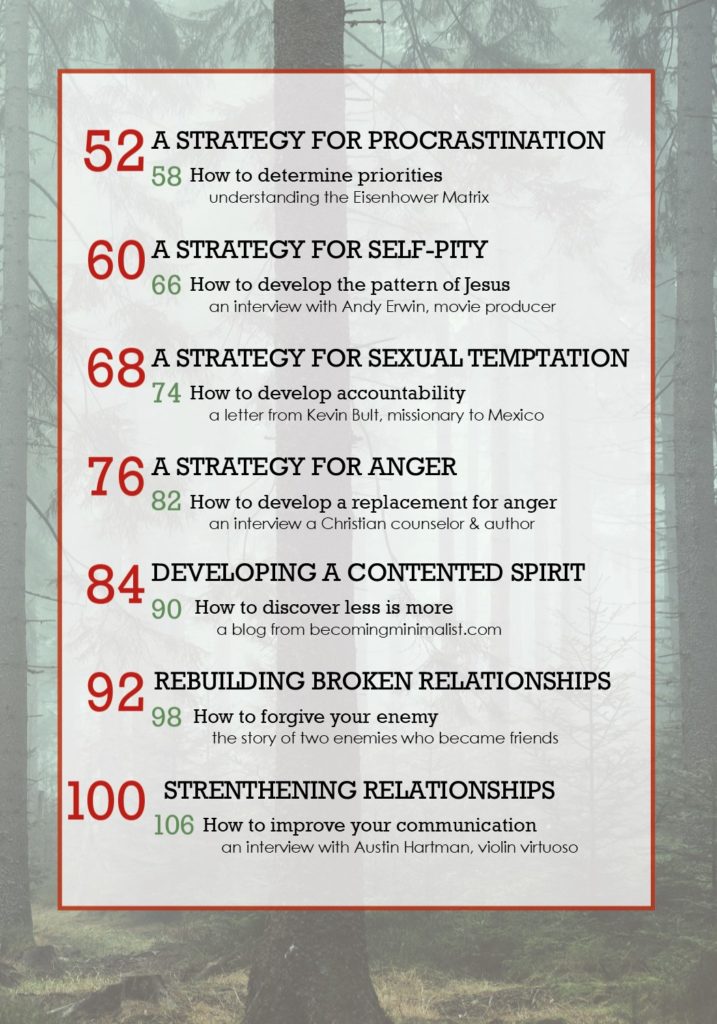
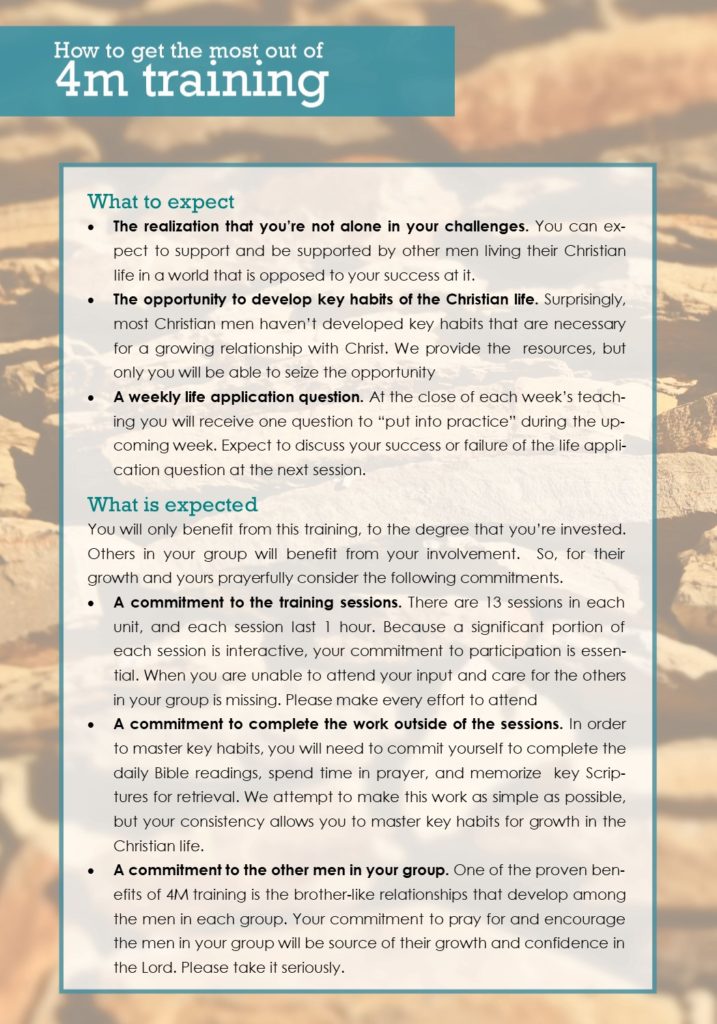
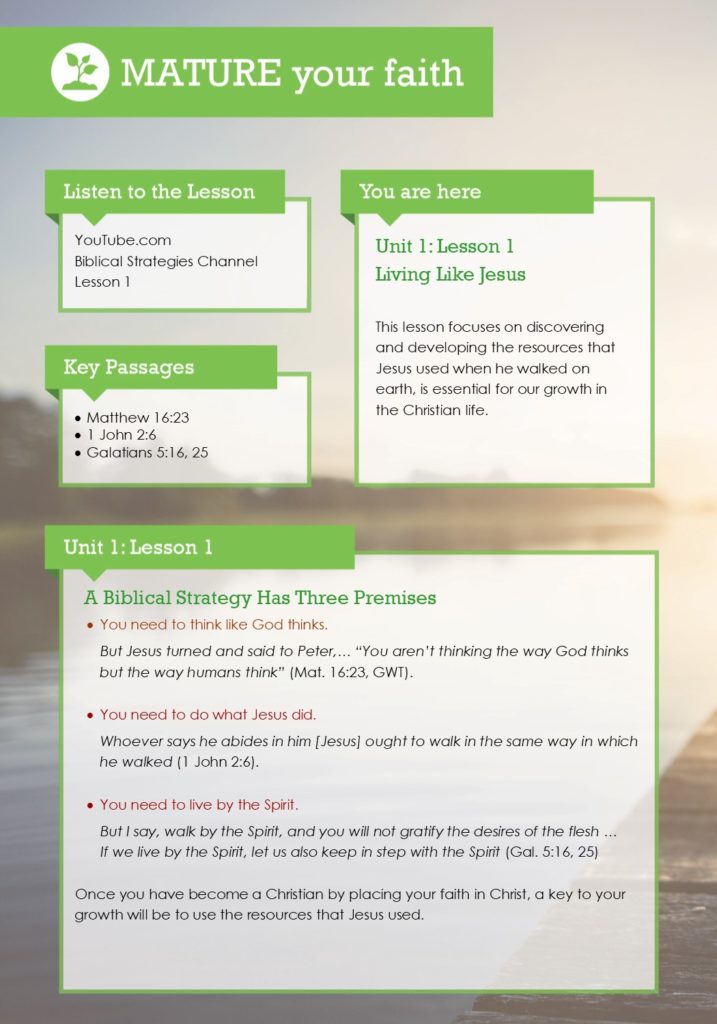
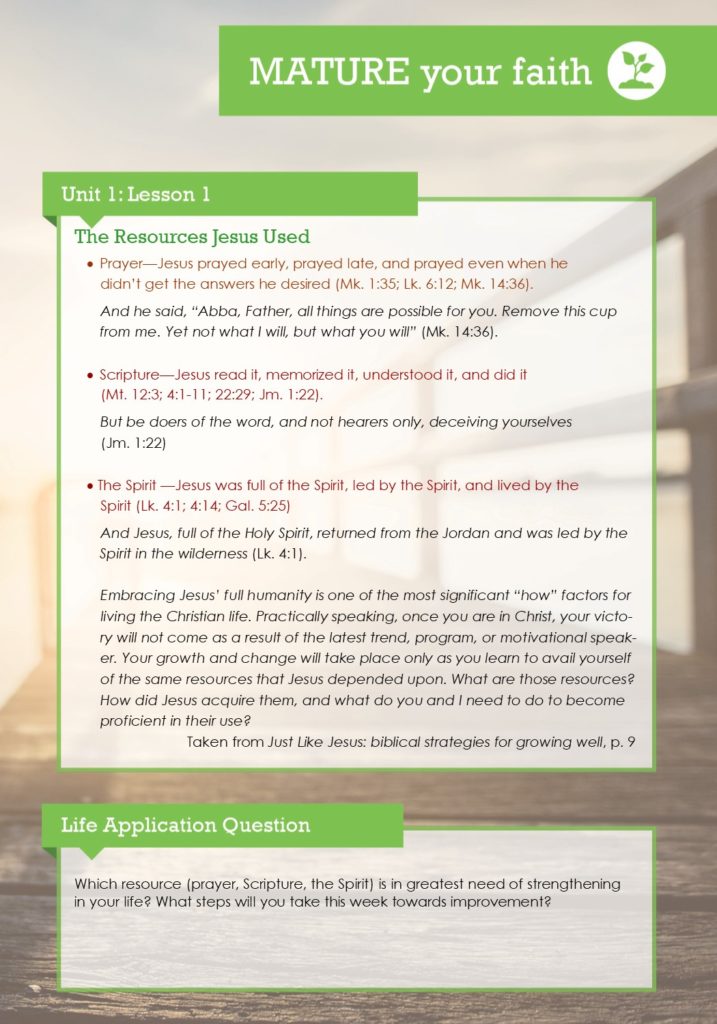
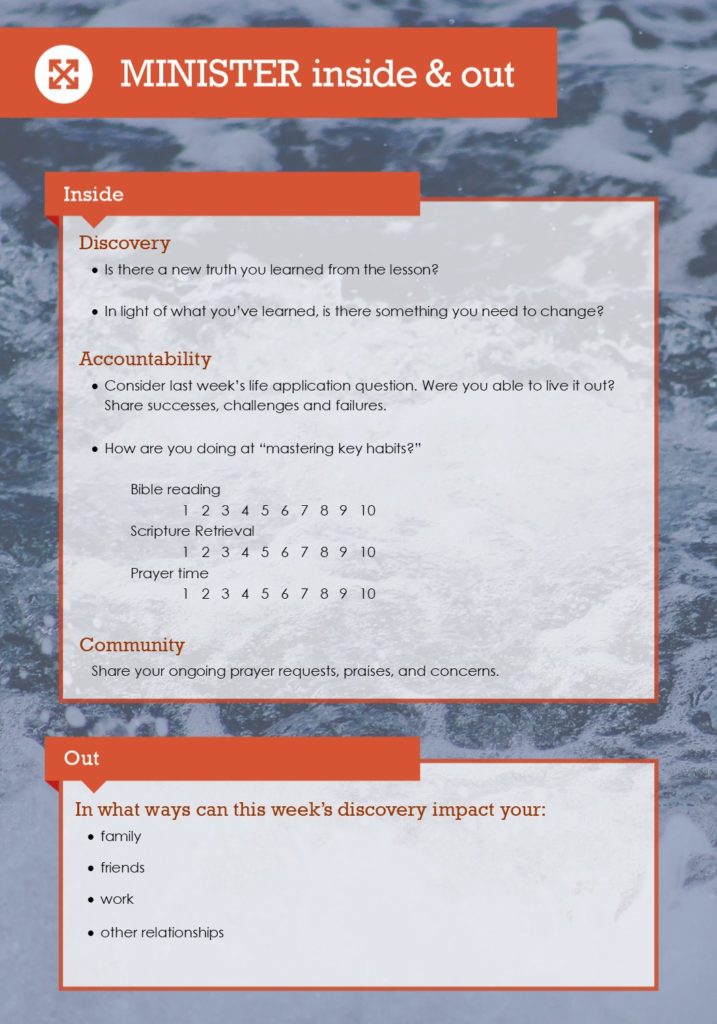
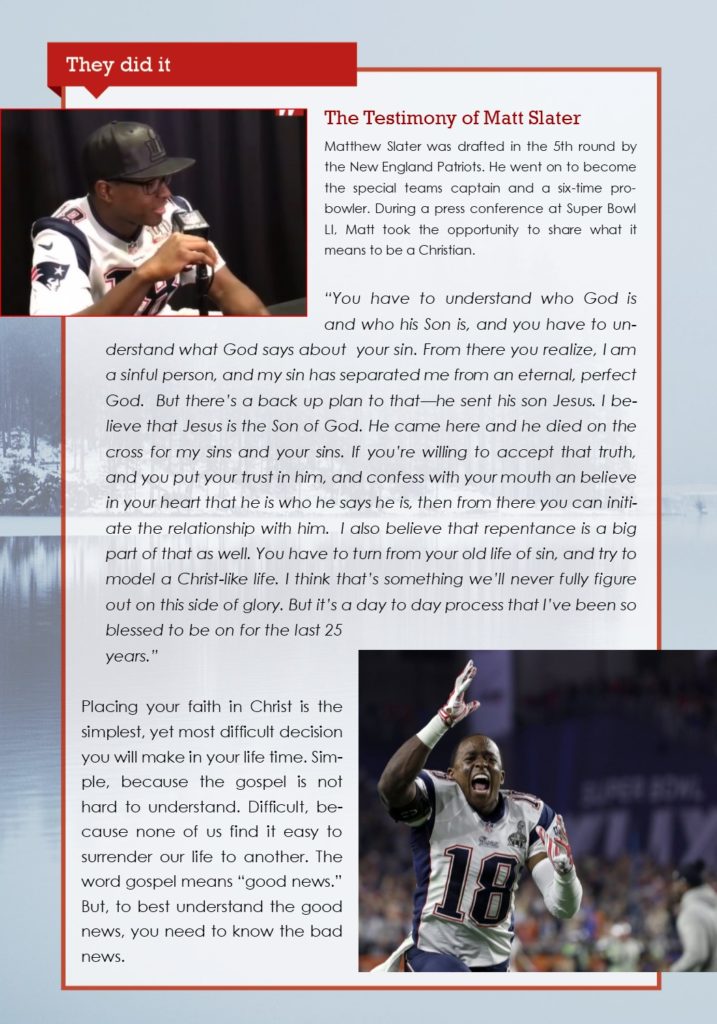
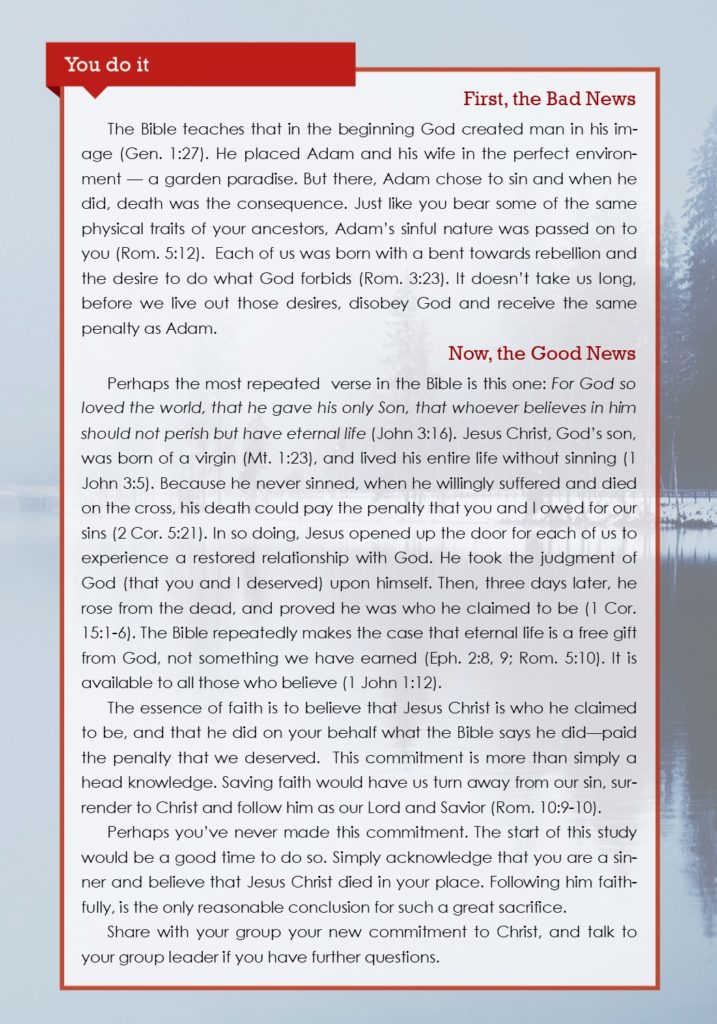



 The New Testament word for anger describes a person who is taking a long time to think about how he will respond. While he’s taking time, he isn’t seeking a spiritual replacement or patiently waiting for God. Instead, he is hunkering down in his hurt, judgment, and indignation. Bible commentator William Barclay refers to this as,
The New Testament word for anger describes a person who is taking a long time to think about how he will respond. While he’s taking time, he isn’t seeking a spiritual replacement or patiently waiting for God. Instead, he is hunkering down in his hurt, judgment, and indignation. Bible commentator William Barclay refers to this as,
 A bitter person is consciously, willfully angry. He refuses to let a hurt go. He insists on making the other person pay. Whereas, the Bible instructs us to set our mind on the Spirit of God, the bitter person refuses to let go of his pain. As he dwells upon how he was wronged, he convinces himself that his anger is justified. Being fully convinced of his interpretation of the facts in his own mind, he secretly continues to accuse his offender. As he does this, the bitterness grows. Soon it effects other areas of his life as well.
A bitter person is consciously, willfully angry. He refuses to let a hurt go. He insists on making the other person pay. Whereas, the Bible instructs us to set our mind on the Spirit of God, the bitter person refuses to let go of his pain. As he dwells upon how he was wronged, he convinces himself that his anger is justified. Being fully convinced of his interpretation of the facts in his own mind, he secretly continues to accuse his offender. As he does this, the bitterness grows. Soon it effects other areas of his life as well.
 When man was created, he was placed in a garden. That garden was perfect in every way, and only one tree was off-limits. Adam and Eve were asked to submit their wills to their Creator by not eating from the tree of the knowledge of good and evil. All was well until their desires were awakened. Then, for the first time, they felt the tension between their will and God’s will. Maybe they’d never considered their choices before. Maybe, just for a moment, they felt pity for themselves because God had denied them the fruit from the one tree. We may never know, but what we do know is this: God wanted something for them, but they wanted something else for themselves. They chose what they wanted and stepped outside of God’s will for the first time. The consequences for their choice were disastrous.
When man was created, he was placed in a garden. That garden was perfect in every way, and only one tree was off-limits. Adam and Eve were asked to submit their wills to their Creator by not eating from the tree of the knowledge of good and evil. All was well until their desires were awakened. Then, for the first time, they felt the tension between their will and God’s will. Maybe they’d never considered their choices before. Maybe, just for a moment, they felt pity for themselves because God had denied them the fruit from the one tree. We may never know, but what we do know is this: God wanted something for them, but they wanted something else for themselves. They chose what they wanted and stepped outside of God’s will for the first time. The consequences for their choice were disastrous.